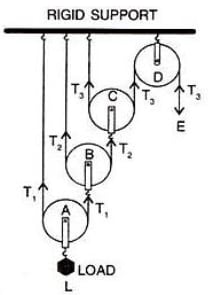Physics
You are given four pulleys and three strings. Draw a neat and labelled diagram to use them so as to obtain a maximum mechanical advantage equal to 8. In your diagram mark the directions of load L, effort E and tension in each strand. What assumptions have you made to obtain the required mechanical advantage?
Machines
96 Likes
Answer
The four pulleys can be used as three movable pulleys with one fixed pulley as shown in the diagram below:

Assumptions are —
(i) The weight of the pulleys and the string is massless.
(ii) There is no friction between the bearings of the pulley.
Answered By
66 Likes
Related Questions
A pulley system has a velocity ratio 3. Draw a diagram showing the point of application and direction of load (L), effort (E) and tension (T).
It lifts a load of 150 N by an effort of 60 N.
Calculate its mechanical advantage.
Is the pulley system ideal? Give reason.
Figure shows a system of four pulleys. The upper two pulleys are fixed and the lower two are movable.

(a) Draw a string around the pulleys. Also show the point of application and direction in which the effort E is applied.
(b) What is the velocity ratio of the system?
(c) How are load and effort of the pulley system related?
(d) What assumption do you make in arriving at your answer in part (c)?
Figure shows a block and tackle system of pulleys used to lift a load.

(a) How many strands of tackle are supporting the load?
(b) Draw arrows to represent tension T in each strand.
(c) What is the mechanical advantage of the system?
(d) When load is pulled up by a distance 1 m, how far does the effort end move?
(e) How much effort is needed to lift a load of 100 N?
(f) What will be its V.R. if the weight of the movable block is doubled?
A block and tackle system has the velocity ratio 3. Draw a labelled diagram of the system indicating the points of application and the directions of load L and effort E. A man can exert a pull of 200 kgf.
(a) What is the maximum load he can raise with this pulley system if its efficiency is 60%?
(b) If the effort end moves a distance 60 cm, what distance does the load move?